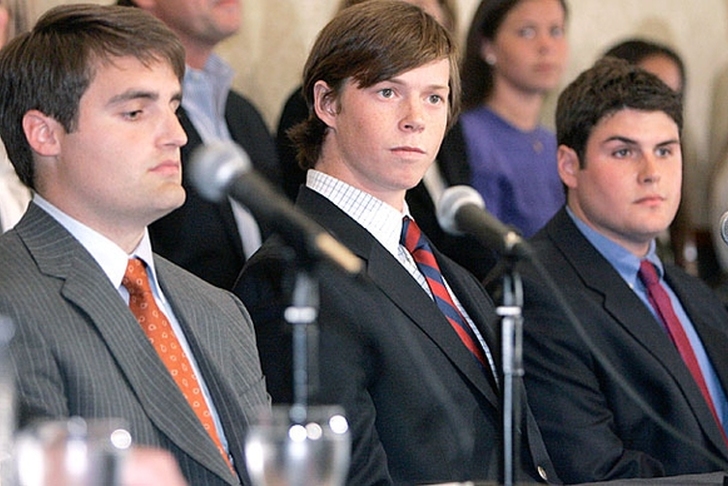ESPN's newest "30 for 30" film, "Fantastic Lies", will detail the famous Duke lacrosse case, a story that captured the attention of the entire country in 2006. The documentary will not only go over the stunning details of the story itself, but also talk about the many societal issues that were invovled.
The case centered around allegations made by Crystal Gail Mangum, who claimed that he was raped by three Duke students while at a team party in Durham on March 13, 2006. Mangum, an African-American who worked as a stripper and escort along with being a student at North Carolina Central University, identified three white members of the lacrosse team as her assailants.
Those involved in the case immediately identified it as a hate crime, sparking immediate outrage across the country and subsequent conversations about race, class, the college party culture, and entitlement.
The Duke lacrosse team suspended the rest of the 2006 season as a response to the allegations, and head lacrosse coach Mike Pressler was forced to resign under pressure from athletic director Joe Alleva. Three players (Reade Seligmann, Collin Finnerty, and David Evans) were arrested and charged with first degree rape, sexual offense, and kidnapping.
There was just one problem - the alleged rape never happened. Here's the story:
Mangum was hired to got to the party along with coworker Kim Roberts, and admitted that she had consumed alcohol and a muscle relaxant before attending the party. However, once the two got to the party, they got into an argument with some of the members of the lacrosse team because they had requested "white strippers," and were upset that Mangum was an African-American and Roberts was half-Asian/half-African-American.
Upon the argument, the two stopped performing and shut themselves into a bathroom in the house. They later came out and got into another argument with the players, after which they locked themselves in the bathroom until they left in Roberts' vehicle.
Roberts and Mangum then got into an argument while leaving the party and Roberts tried to push Mangum out of the car, but was unsuccessful. She then drove to a grocery store and told a security guard that someone was refusing to leave her car. The security guard came outside, suspected Mangum of being under the influence of drugs, and called police.
When the police arrived, Mangum refused to talk to them, had no identification, and had trouble walking. The police then took her to a mental-health and substance-abuse facility, during which she said she had been raped while at a party.
Durham Country District Attorney Mike Nifong iimmediately special interest in the case and took over as lead prosecutor. By his own admission, he dedicated over 40 hours to reporters during the first week of their investigation into the case, often being heavily critical of the members of the lacrosse team, their alleged failure to cooperate or provide information to investigators, and repeatedly injected his own opinion - which was that one or more members of the lacrosse team were guilty and that the crime was racially motivated.
Over the course of the ensuing month, Mangum was shown several photo lineups, but only picked out Seligmann, Finnerty, and Evans when their pictures were shown to her individually. She did not name them as attackers when they were included in a photo lineup weeks earlier. The three players were arrested weeks later.
However, as the investigation went into the summer, questions began to emerge about Mangum's timeline of events, but DNA evidence still linked the three players to the crime. That was until December, when Brian Meehan, who was the director of the lab that tested the DNA, admitted that he had withheld information from the original DNA report at Nifong's request.
Nifong dropped the rape charges against the players one week later, and had two rounds of ethics charges brought against him. He was disbarred in June 2007.
Seligmann, Finnerty, and Evans filed a defamation lawsuit against the City of Durham in 2007, calling for new criminal justice reform laws.
Mangum didn't face any charges for her false allegations.
ESPN said in a statement that they were drawn to make a documentary about this case because of the multitude of social and cultural topics the case involved.
“Fantastic Lies” will return to the night of March 13, 2006, when Duke University lacrosse players threw a team party that ended up changing lives, ruining careers, tarnishing a university’s reputation and even jeopardizing the future of the sport at the school. The film, from acclaimed director Marina Zenovich (“Roman Polanski: Wanted and Desired”), will premiere on the 10th anniversary of the party that ignited what became a national firestorm and resulted in a highly-charged legal investigation. Usually confined to the sports section, lacrosse suddenly appeared on the front pages of newspapers because of the lurid details of the case and the hot buttons that it pushed: sex, race, class, violence.
"Fantastic Lies" will first air on Sunday, March 13, at 9:00 pm ET on ESPN.
Back to the Duke Blue Devils Newsfeed